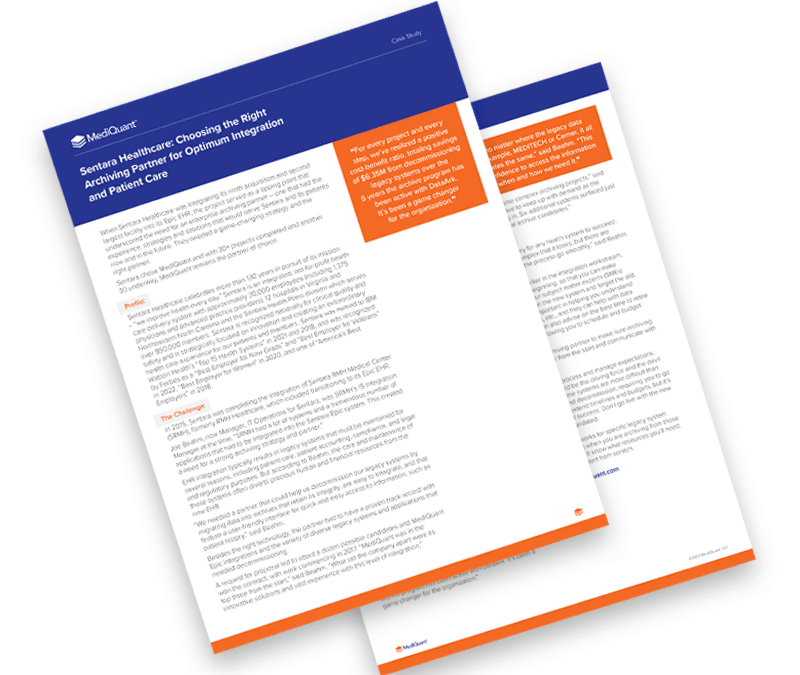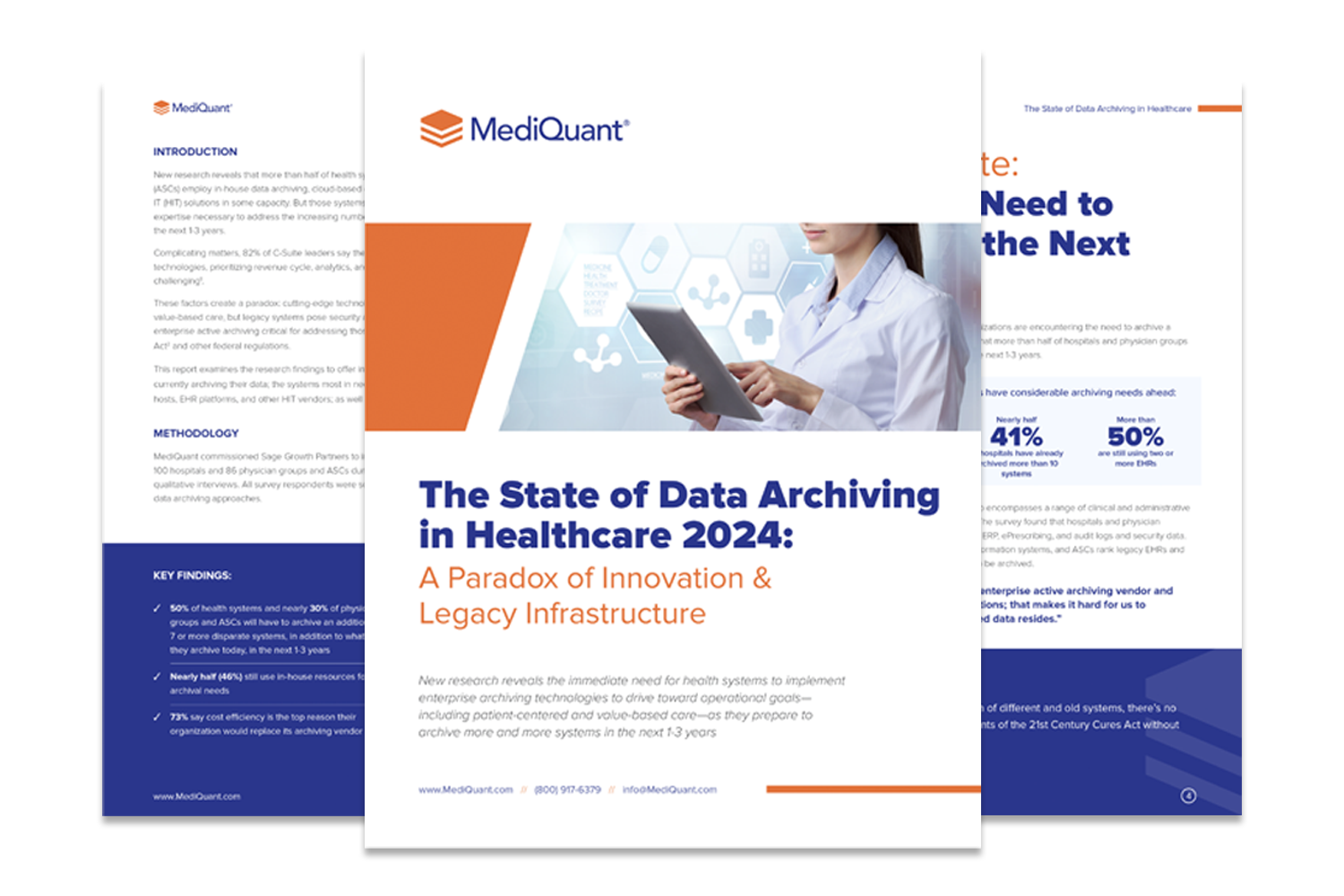When Sentara Healthcare was integrating its ninth acquisition and second largest facility into its Epic EHR, the project served as a tipping point that underscored the need for an enterprise archiving partner – one that had the experience, strategies and solutions that would serve Sentara and its patients now and in the future. They needed a game-changing strategy and the right partner. Sentara chose MediQuant and with 30+ projects completed and another 30 underway, MediQuant remains the partner of choice.
Profile:
Sentara Healthcare celebrates more than 130 years in pursuit of its mission – “we improve health every day.” Sentara is an integrated, not-for-profit healthcare delivery system with approximately 30,000 employees (including 1,375 physicians and advanced practice providers), 12 hospitals in Virginia and Northeastern North Carolina and the Sentara Health Plans division which serves over 950,000 members. Sentara is recognized nationally for clinical quality and safety and is strategically focused on innovation and creating an extraordinary healthcare experience for our patients and members. Sentara was named to IBM Watson Health’s “Top 15 Health Systems” in 2021 and 2018, and was recognized by Forbes as a “Best Employer for New Grads” and “Best Employer for Veterans” in 2022, “Best Employer for Women” in 2020, and one of “America’s Best Employers” in 2018.
The Challenge:
In 2015, Sentara was completing the integration of Sentara RMH Medical Center (SRMH), formerly RMH Healthcare, which included transitioning to its Epic EHR.
Joe Beahm, now Manager, IT Operations for Sentara, was SRMH’s IS Integration Manager at the time. “SRMH had a lot of systems and a tremendous number of applications that had to be integrated into the Sentara Epic system. This created a need for a strong archiving strategy and partner.”
EHR integration typically results in legacy systems that must be maintained for several reasons, including patient care, patient accounting, compliance, and legal and regulatory purposes. But according to Beahm, the care and maintenance of these systems often diverts precious human and financial resources from the new EHR.
“We needed a partner that could help us decommission our legacy systems by migrating data into archives that retain its integrity, are easy to integrate, and that feature a user-friendly interface for quick and easy access to information, such as patient history,” said Beahm.
Besides the right technology, the partner had to have a proven track record with Epic integrations and the variety of diverse legacy systems and applications that needed decommissioning.
A request for proposal led to about a dozen possible candidates and MediQuant won the contract, with work commencing in 2017. “MediQuant was in the top three from the start,” said Beahm. “What set the company apart were its innovative solutions and vast experience with this level of integration.”
The Solution:
Much of Sentara’s legacy data is housed in static archives, including electronic medical records (EMRs) and patient accounting records. “We typically retain about 25-plus years’ worth of clinical records and about 10 years’ worth of patient accounting records that were formerly housed in various legacy systems,” said Beahm. The combined need for active archives and less frequently accessed data can be managed at different levels.
DataArk® enables seamless, secure and compliant single-click access to functioning legacy data within Sentara’s current active user environment. More recently, Sentara is using it to manage patient Accounts Receivables (ARs) – dropping bills, posting payments, adding notes and actively capturing revenue that might otherwise be forfeited. DataArk is also helping the organization improve both the clinician and patient experience by facilitating access to historical clinical data for both clinical care and patient Requests for Information (RFIs). In addition, MediQuant’s OpenArk™ provides a cost-effective, compliant, and safe platform for infrequently accessed legacy data, making it available via reporting tools and other applications.
“What set the company apart were its innovative solutions and vast experience with this level of integration.”
MediQuant’s universal user interface integrates legacy data with the new Epic EHR. “Essentially, no matter where the legacy data originated, for example, MEDITECH or Cerner, it all looks and operates the same,” said Beahm. “This gives us the confidence to access the information we need, when and how we need it.”
The Results:
Sentara’s IT strategy is to regularly retire legacy systems, lowering costs on the back end and enabling these funds to be used for innovative IT solutions and analyses that help enhance patient and member experience.
Beahm credits Sentara’s archiving success to an efficient and robust process that ensures data integrity by avoiding extraction and migration shortcuts. There are multiple validations and signoffs, including additional data retrieval as needed.
“For every project and every step, we’ve realized a positive cost-benefit ratio, totaling savings of $6.35M from decommissioning legacy systems over the 5 years the archive program has been active with DataArk. It’s been a game changer for the organization.”
“Essentially, no matter where the legacy data originated, for example, MEDITECH or Cerner, it all looks and operates the same,” said Beahm. “This gives us the confidence to access the information we need, when and how we need it.”
“We’ve completed some complex archiving projects,” said Beahm. “Now, we have to keep up with demand as the projects keep rolling in. Six additional systems surfaced just last week as potential archive candidates.”
Advice for Others:
“Archiving is necessary for any health system to succeed. It can be far more complex that it looks, but there are ways you can make the process go smoothly,” said Beahm. His advice:
• Move archiving earlier in the integration workstream, preferably at the beginning, so that you can make optimum use of your subject matter experts (SMEs) before they train on the new system and forget the old. These SMEs are important in helping you understand workflow, nuances, etc., and they can help with data validation. They can also advise on the best time to retire legacy systems, allowing you to schedule and budget efficiently.
• Work with your archiving partner to make sure archiving proposals are clear from the start and communicate with them regularly.
• Work through the process and manage expectations. Data integrity should be the driving force and the devil is in the details. Some systems are more difficult than others to archive and decommission, requiring you to go deeper, and even extend timelines and budgets, but it’s important to overall success. Don’t go live with the new system until all is validated.
• Take note of what works for specific legacy system applications so that when you are archiving from those systems again, you’ll know what resources you’ll need. You won’t have to start from scratch.



